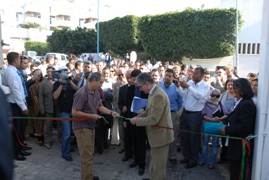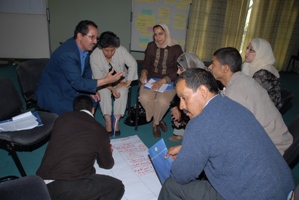New CCDH Regional Section in Agadir
After the regional offices of Oujda and Laayoun, the President of the Advisory Council on Human Rights (CCDH), Mr. Ahmed Herzenni inaugurated on May 16, 2009 the CCDH third regional administrative section in Agadir.
Within this framework, the Agadir administrative section will perform the following tasks:
- referral and reception of citizens;
- disseminating and upholding the human rights culture through making national and international instruments available to the public, holding outreach and training activities, and promoting the human rights education;
- developing programs to promote economic, social and cultural rights, taking into account the local particularities of each region;
- monitoring cases of human rights violations and filing relevant reports to the CCDH;
- receiving, examining and filing preliminary opinions to the CCDH as regards complaints, and individual and collective requests on human rights issues;
- following up and facilitating the implementation of the Equity and Reconciliation Commission’s recommendations at the regional level, as regards individual compensation, medical cover and community reparation;
- carrying out studies and probes;
- drawing up periodic report on the status of human rights in the region.
In his opening statement, Mr. Ahmed Herzenni said that the opening of regional sections was part of an outreach approach. He also noted that the CCDH was going to develop a strategy for economic, social and cultural rights, without ruling out the work on civil and political rights, recalling that human rights are indivisible.
Mr. Herzenni also recalled the leading role of the city of Agadir in the economic field. He said that the environment was conducive to greater cooperation between various actors for a real evolution in the field of human rights.
Mr. Tarik Kabbaj, Mayor of the city of Agadir, congratulated the CCDH for the initiative to establish a regional section in a region that has played a major role in the independence and democracy-building of Morocco. Mr. Kabbaj said that it is a region where there were many victims during the period known in Morocco as the years of lead, including Mohamed Grina.
He also recalled that the CCDH, who is responsible for monitoring the implementation of the recommendations of the Equity and Reconciliation Commission (IER) and whose prerogative are were expanded, noted the needs of the region as regards the promotion of the local culture, including the Amazigh culture, the fight against corruption, economic and social rights including the right to adequate housing ...
Also, Mr. Kabbaj called for cooperation between elected officials and the CCDH.

On the same occasion, the CCDH organized on May 16, 2009 a workshop on the situation of human rights in the region. The meeting, which was attended by several stakeholders (associations, government departments, researchers ...), included a general presentation on civil, economic, social, cultural and environmental rights and three workshops.






















